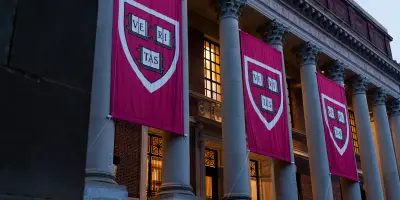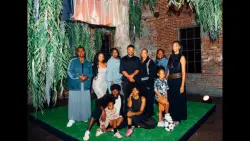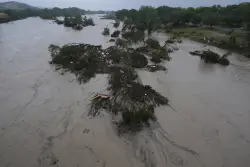We’re Publishing the Speech That Harvard Suppressed for Mentioning Genocide

Harvard Divinity School refused to publish this year’s commencement speech after one of its speakers went off-script to acknowledge the genocide in Gaza, as The Intercept reported last month. Now, The Intercept is publishing recent Divinity School graduate Zehra Imam’s part of the speech for the first time. The suppression of the speech came as Harvard University received public praise for refusing to abide with demands from the Trump administration in its stated crusade against antisemitism at the nation’s universities, which the administration has used to justify a crackdown on speech advocating for Palestinian rights. Earlier this week, Trump again threatened to cut Harvard’s federal funding — this time, all of it — after the administration found that the school had violated the Civil Rights Act and tolerated antisemitism on campus. Related A Harvard Commencement Speaker Mentioned Gaza. The School Refused to Publish Her Speech. The school had “been in some cases deliberately indifferent, and in others has been a willful participant in anti-Semitic harassment of Jewish students, faculty, and staff,” Trump’s Joint Task Force to Combat Anti-Semitism argued in a letter to Harvard President Alan Garber on Monday. Harvard said it disagreed with the administration’s findings and took allegations of antisemitism on campus seriously. It was the latest development in a monthslong, multiagency battle between President Donald Trump and Harvard over his sweeping demands for changes at the school, including an end to all practices designed to address diversity and equity, censorship of its curriculum, and punishment of pro-Palestine student protesters. The school has been hailed for its proclaimed resistance to these efforts and for its lawsuit against the Trump administration over the president’s order to bar would-be international students, which a judge indefinitely blocked earlier this week. In private, however, Harvard has quietly capitulated to Trump’s threats. Students and staff at the Divinity School who spoke to The Intercept connected the school’s refusal to publish the commencement speech to its efforts to dismantle a program that offered a trip to the West Bank and coursework on Israel and Palestine, among other topics. While the U.S. government and much of the mainstream media fixates on Harvard’s handling of antisemitism, findings from a concurrent investigation into anti-Arab, anti-Muslim, and anti-Palestinian bias at the school have received far less attention. In January, Harvard settled a lawsuit alleging discrimination by the school against Palestinian, Arab, and Muslim students. Read our complete coverage Chilling Dissent Harvard declined to publish the video of Imam’s speech due to “security concerns,” as The Intercept previously reported, and made a password-protected version temporarily available to users with Harvard logins. Students and staff at the Divinity School called the decision unusual, noting that past speeches had been made public. Several raised concerns that the school was forsaking its pledges to address anti-Muslim, anti-Arab, and anti-Palestinian bias on campus in the name of fighting antisemitism. Imam told The Intercept that her goal was to shift attention to unlivable conditions that Palestinian people continue to suffer in Gaza, and said it was the responsibility of Divinity School students studying religion and the world not to look away. Despite Harvard’s decision not to publish its video of Imam’s speech, clips quickly circulated online and on social media. The Intercept has chosen to publish the video and full transcript of her speech, which discusses centuries-old Islamic history alongside the contemporary experiences of Palestinian students and children. “There are no safe zones left in Gaza after 600 days and 77 years of genocide,” Imam said in her commencement speech in May. “I center these students with urgent desperation because time is running out — no meaningful aid has entered Gaza since March 2, and this is on our account. I center Palestine today not just because of its scale of atrocity but because of our complicity in it.” Imam’s speech is below. https://youtu.be/a8Mw2mELF4g?si=Wz1Gdc7f2OVNlqBE Bismillah ir rahman ir raheem — in the name of God the most beneficent the most merciful Who are the people who accompany you when you find yourself in the wilderness? Who are the people who hold you accountable when you have wronged someone? Who are the people who remind you of your worth and give you the courage to try again? And who are the people who sit with you as we witness the moral injuries of our time? From Somerville and Cambridge to Palestine, Congo, Kashmir, Arakan, Armenia, Sudan and beyond. For me, it is my students. For me, it is my grandmother. When I was a child, during the holy month of Muharram, my grandmother would lead me by the hand to gatherings that would become a gift for me in moments of moral chaos, teaching me what it means to grieve extreme loss and how to stand with those who long for justice, even if you find yourself standing alone on the sand dunes of a final destination called Karbala. On 10 October, 680 CE, in that place called Karbala, there was a family that refused to be ruled by a tyrant. Imam Hussain, grandson of Prophet Muhammad, and his family did not submit to a political power because his conduct was unjust and unethical. For this, 72 members of the Prophet Muhammad’s (pbuh) family were martyred in battle by an army of thousands. And yet, even in facing these odds, Imam Hussain gave water to his enemies. Moved by this act of humanity, Hurr, the commander of the army on the opposing side, sought out Imam Hussein that night. Imam Hussein rose to greet him, saying, “I had been waiting for you to arrive.” And Hurr, whose name means freedom, switched sides. A full accounting of the Battle of Karbala is this: Seventy-two lives lost. But one soul gained. Who are the people we are giving water to? Who are the people we are withholding water from? Last year, I had the privilege and honor of offering a class called “Poetry of the Camps” to students in besieged Gaza. We came together to write poetry as fires raged across the north of Gaza, ignited by an onslaught of Israeli airstrikes. In the wilderness of their genocide, working with these students was the only thing that got me out of bed because it was one small way I could grieve their extreme loss and stand with each of them as we continue to fight for their freedom and justice. One of them, Hend, is a medical student at Al-Azhar University in Gaza. Like us, Hend loves learning. “I was raised to love books,” she wrote, “I never thought I would have to feed them to a fire so I could have a meagre meal. Genocide has pushed us to do things we never imagined in our darkest nightmares.” Israel has bombed every university in Gaza. This week, I witnessed a 6-year-old Palestinian girl named Ward — a flower amongst the flames — run to save herself after Israel bombed every family member she knew at a school serving as a shelter. Earlier this month, as Pakistan faced airstrikes from Israeli-made drones, it was Esraa from Gaza who checked in with me about my family’s safety. When I thanked her, she said, “Living through hardships and suffering doesn’t mean that we can underestimate other people’s suffering. I wish you safety.” There are no safe zones left in Gaza after 600 days and 77 years of genocide. I center these students with urgent desperation because time is running out — no meaningful aid has entered Gaza since March 2, and this is on our account. I center Palestine today not just because of its scale of atrocity but because of our complicity in it. Class of 2025, Palestine is waiting for you to arrive. And you must be courageous enough to rise to the call because Palestine will keep showing up in your living rooms until you are ready to meet its gaze. Here, I must acknowledge that, together in the wilderness, we have witnessed the risks that have come with speaking up for this very genocide to be far-reaching. Yet no matter how charged with punishments the scroll, again and again, we witness too the enormous hearts, unwavering courage, and profound wisdom of students like Rumeysa Ozturk, Mahmoud Khalil, Mohsen Mahdawi, and countless others who are in this very audience with us today, such as Elom Tettey-Tamaklo, our friend and classmate who continues to show up not just for Palestine but for each of us by extending to us the water we need in our most vulnerable moments. Together, we must refuse to be ruled by the tyrants of our time because our liberations are intertwined. We gather now to take our second census. The three of us stand before you not because it was easy to do this together but because it was absolutely vital in a world that has given us chasms so wide no bridge seems to want to meet us along the path. We chose to do this anyway and carve our own path by not lying to one another on the journey. These moments when we dream together in the wilderness are when we absolutely need each other. An honest reckoning is what can prepare us for those dreams of humanity that will endure. My final poetry session with students in Gaza was on freedom. I asked them: What would the first day of freedom look like? How would it feel on a sensory level? What colors would the day bear; who would they embrace; what scents would come alive on this day of liberation; what tastes would be fulfilled? I leave us with a response from my student and Palestinian writer Duha Hasan’s dream of freedom: I had a dream I went back home Slept on my bed Felt warmth again I had a dream I went to college Nagged all day How hectic it was I had a dream I wanted to live I had a dream I had my favourite meal I had a dream My ears forgot the war’s sounds shouting, bombardment, mother’s sobs, and losses I had a dream My eyes forgot the blood, the loss, the patience Obligatory patience My nose forgot the smoke smell, the deaths, the corpse rotten My hands stopped shivering My body skipped what I had lived I had a dream Not panicking Not imagining death everywhere I had a dream The post We’re Publishing the Speech That Harvard Suppressed for Mentioning Genocide appeared first on The Intercept.


